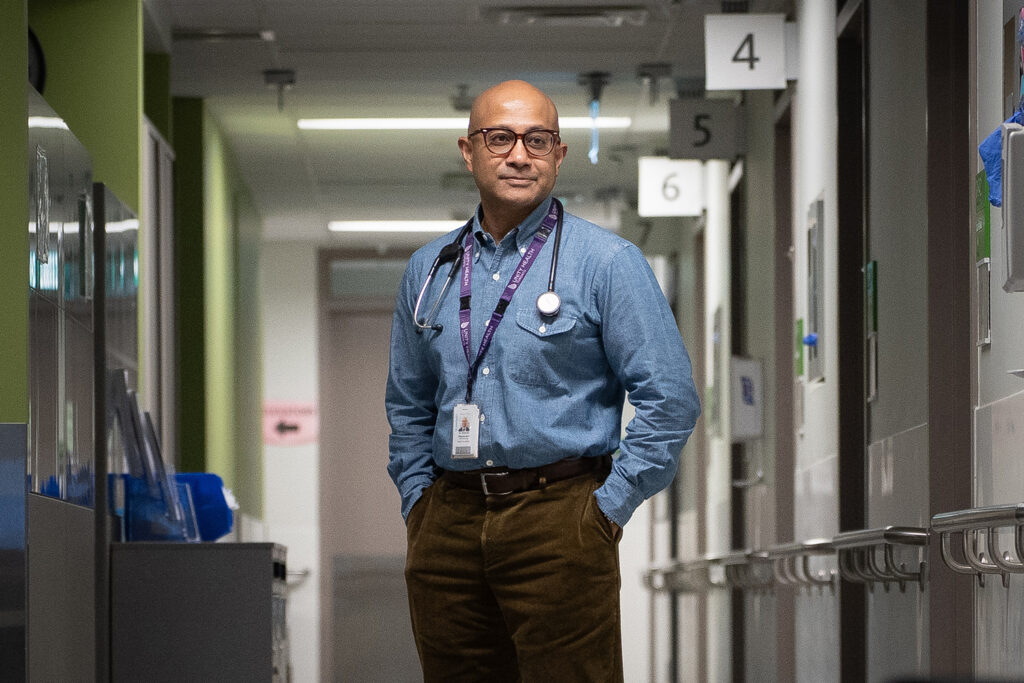National study led by St. Michael’s researcher finds that more than 1 in 6 older adults suffer from new disabilities after major surgery

Dr. Duminda Wijeysundera
A national study led by St. Michael’s Hospital researcher found that 1 in 6 older adults suffer new disabilities – or even death – within six months after going through major surgery. This increased to 1 in 5 older adults after one year.
Older adults frequently tell physicians that the ability to return to meaningful life activities is one of the most important outcomes after major interventions like surgery. Yet, results found that a significant proportion fail to achieve this important goal.
The study, published in The Lancet Healthy Longevity, included more than 2,000 patients and offers new insights into the risk of new disability after major elective surgery. Research included 17 hospitals across multiple Canadian provinces and focused on a range of major non-cardiac surgeries. Participants were assessed at five postoperative time points over twelve months.
- CTV News covered these important findings. Find the story here
Findings showed that patients who suffered from a new disability at 6 months or 1 year after surgery also experienced other negative postoperative experiences. In the months and year after surgery, these patients suffered from more pain, greater depressive symptoms, and poorer quality of life. Also, a much higher proportion regretted their original decision to have surgery.
The researchers also identified several baseline factors that were present before surgery and led to increased risk of death or disability. These included frailty, cognitive impairment, mobility limitations, smoking, open surgical procedures, and unmet social support.
“The results of the study point to an important disconnect between what patients have indicated is important to them, and what we are apparently achieving in the health system,” says Dr. Duminda N. Wijeysundera, lead investigator, anesthesiologist in the Department of Anesthesia at St. Michael’s Hospital (part of Unity Health Toronto) and Head of Science at the Applied Health Research Centre (AHRC).
Enjoying this story? Sign up for the Unity Health Toronto newsletter, a monthly update on the latest news, stories, patient voices and research emailed directly to subscribers.
Wijeysundera continues, “We anticipate that these results will encourage clinicians, patients, and caregivers to engage in more evidence-based discussions about recovery expectations and planning.” Examples of supportive interventions from health systems include planning for postoperative needs, targeting frailty programs and geriatric co-management to care for those at greater risk.
Dr. Ashley Verduyn, Director of Medical Affairs and Chief of Providence Healthcare, part of Unity Health Toronto, says these findings reinforce the value of identifying at-risk patients and working closely with their caregivers and supervising clinicians. She also stresses the need to prioritize post-acute rehabilitation to optimize outcomes.
“Post-acute rehabilitation is an important part of recovery for older adults after surgery,” said Verduyn, a hospitalist caring for patients in the geriatric and medical rehabilitation program at Providence Healthcare. The hospital is a regional leader in older adult care, rehabilitation, palliative and long-term care with Unity Health Toronto.
“Rehabilitation helps older adults regain independence, return to their daily routines, and improve their overall well-being and quality of life. Proper recovery care supports healing not only from the surgery itself, but also from the physical and cognitive decline that can occur during hospitalization. It reduces the risk of complications, helps prevent long-term disability, and makes the transition back home safer,” continues Verduyn.
Dr. Wijeysundera also emphasizes the importance of assessment prior to surgery.
“Thorough assessment of common risk factors before surgery, such as frailty and cognitive function, can go a long way in enhancing shared decision making, care planning and recovery. These same assessments, in turn, support identification of older adults who are at increased risk of developing a new post-operative disability.”
To read the full study click here.
By Anna Robinson
Photos by Kevin Van Passen
